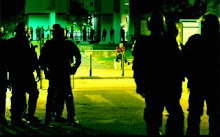5 vinyls which treasure the audiotext Hacía un ruido (a) Como si fuera un mundo entero (b)
5 covers painted by Kiko Pérez
Booklets. Shiny paper, tracing paper, photo paper, recycled paper; die; staple. 250 copies (orders: sra.ramsay [at] gmail.com)
Marker Signane
Marker Signane
Notes
on Orality_Suomenlinna_sept/oct 014_10/10/014
- Since the first part of Ranchito residency, I've been working with orality / oral materiality.
- I have been working with some oral texts I once recorded. I have transcribed those tapes and I have manipulated these transcriptions in order to get a little bit of poetry from/among/with them, or rather a little bit of consciousness of the poetic language in which these texts are made.
- I've been also collecting & collaging many sentences from the internet. Internet is a language. It is a vernacular language. Even though it looks like mostly written, it seems to me that it is mostly spoken. Sometimes it is spoken through audios & videos; sometimes it is spoken through writing. But it is mostly written speech. It is not an oral language exactly, but an oralized writing it is. Does this make any sense?
- I like to go see sentences. I like to go seeing phrases. I like to go to see sentences. I like going seeing sentences. Does this make any sense? I don't know how to write this sentence in English. I don't know how to pronounce it. “This may be acceptable to an AE speaker but not in BE”. This is correct. “This is very awkward and not at all idiomatic”. This is correct. I like. Go seeing sentences. Go to go to seeing sentences. Phrases. I like to go to see sentences. I like going seeing phrases. I like go seeing sentences. I don't know how to write this sentence. But we don't. But we don't speak English as our first language. But I love. But I love reading Gertrude Stein. But I love to go reading Stein on a sunny day. But I don't know how to write this sentence I want to write. I like going see sentences. Being seated watching sentences passing by. Making them sound. Making us sound. Making us listen making them sound. Go see them being made sound. Go seeing them being made rephrased. Does this make any sense?
- Some sentences sometimes become verses. Not prayers, verses. Laic-saint verses. A verse is memory. A verse is a unity of language that you remember. A unity of memory is a verse. Since Poetry exists. If you can't remember it, then it is not a verse. A good verse is memorable. Even though it looks hardly memorable, you will remember a good verse. It can be metrical but not memorable and then it is not a verse. It can just be just an ordinary sentence out of a poem. When you pick it and remove it from discourse and introduce it into any other course of language, any other river, it becomes a verse. Maybe verses or sentences don't have to belong to poems anymore. Maybe they don't have to happen inside poems any more; or not necessarily.
- A verse is an act of coming back. Repeating. Returning. Repeating. Returning. To memorize. Memory belongs to verses more than it belongs to words. Maybe that's the beginning of Poetry: making some sentences become slightly different so they can be remembered. From Homer to Shakespeare to Stein & Beckett. And so. Mnemonic. Amnamesis. Reminiscence // Flashcard /// Textured ;;;; river zone
- Orality or common speech it's full of returning & repetition. It is crowded with people of all ages ;;; or all ages memory
- When you write a good sentence, you know it. When you listen to a good one, you know it. I think you know it. Cause it brights, like gold. If you look-look intensely at it and repeat it and make it return, you can make it become kind of a verse or so. A good verse treasures a quantity of language that truly brights the brain inside.
- There's a river of golden language flooding outside poetry and you can touch it. Touching gold & rivers & floods. You cannot put a fence if the fence is not made of golden language itself
- That's the job I'd like to have: to go seeing the river of phrases passing by + to copy-paste-manipulate them = A phrases & verses landscape Audiotext that you can touch
 |
| hacía un ruido; audiotext-action. Photography by ISSA TOUMA (c) |
 |
| hacía un ruido; audiotext-action. Photography by ISSA TOUMA (c) hacía un ruido; audiotext-action. Photo by TUOMAS LAASANEN / HIAP (c) |
hacía un ruido; set. Photography by TUOMAS LAASANEN / HIAP (c)
















1 comentario:
One can look at seeing;
one can't hear hearing.
Publicar un comentario